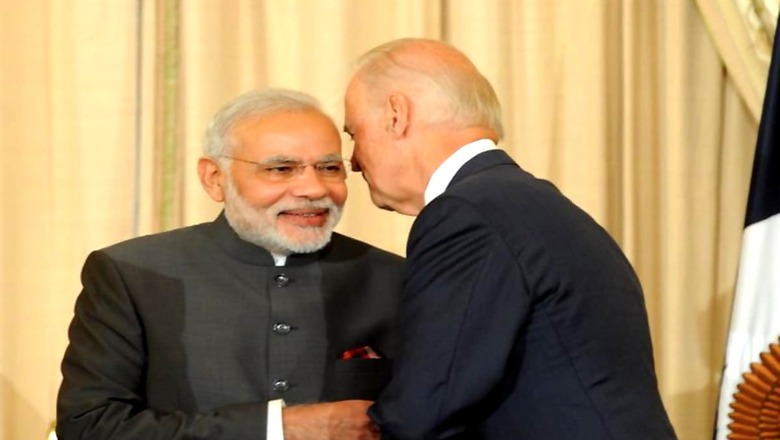
views
A brewing storm in India-US ties has been avoided. The decision by the Biden administration to extend the Defence Production Act (DPA) originally invoked by Trump (18 times to aid vaccine development) to “expedite critical materials in vaccine production, such as equipment, machinery and supplies” to boost vaccine production in the US has had repercussions in India. It has threatened supplies of critical ingredients for vaccine manufacturing in India at a time when India is in the throes of a severe second wave and the government has decided to vaccinate all who are 18 and above, for which vaccination production will have to be ramped up.
This law enacted in 1950 gives the US president powers to allocate “materials, services, and facilities” and award contracts that take priority over any other contract to “promote the national defence”, which, in this case, is to defend the country against the virus. The law can also be used to prevent companies from exporting certain essential vaccine ingredients. According to reports, President Biden has helped Pfizer get equipment to raise its vaccine production, and aided Johnson and Johnson to produce vaccines around the clock with the logistical support of the Department of Defence.
The public reaction in India to the US decision, which, as it happens is not altogether new, has been intense after the issue came into the public domain with the public appeal of the CEO of the Serum Institute of India to the US President to allow the supply of needed ingredients to India, to which the response of the US State Department has been remarkably ham handed. Its spokesperson claimed that the Biden administration’s first obligation was to take care of the requirements of the American people and that “It is not only in the US interest to see Americans vaccinated; but it is in the interests of the rest of the world to see Americans vaccinated”. For several days, as public anger in India mounted, the US side chose to remain equivocal in addressing the issue of India’s pressing needs.
The Biden administration announced a return to multilateralism, spurned by Trump, but it does not square up with its display of vaccine nationalism. International cooperation to fight the Wuhan virus pandemic collectively will be a real test of multilateralism, for which the US could take the leadership in line with its stated ambition to lead the world again. But on the critical issue of the pandemic, the US has sent “an America First” signal. What is worse, it has China-like sought to leverage its control of critical health supply chains to national advantage.
Most would be unaware that the US has a stranglehold on the global vaccine production, what with its capacity for innovation and control over critical ingredients. Even our policy makers have not been aware of the depth of this control until after being briefed by representatives of our pharmaceutical industry following the effective US ban on exports. The invoking of the DPA has also meant that access to suppliers elsewhere has run into difficulty, as these suppliers have diverted their supplies to the US for fear of secondary sanctions if they fell afoul of the US law. Indian companies have signed contracts with Sputnik, but the Russian company cannot produce the volumes needed as it too is dependent on some supplies from the US.
Damage Control
With some delay, the US has retraced its steps and is now willing to meet India’s needs. The US National Security Adviser has spoken to his Indian counterpart, recalling in an official release the longstanding health partnership between the two countries, resolving that the US and India will fight the pandemic together and recognising that India had sent assistance to the US earlier when the pandemic had first struck it. The US, it said, will make available to India immediately the raw materials urgently required for the manufacture of Covishield vaccine, in addition to therapeutics, rapid diagnostic kits, ventilators, PPEs, oxygen generation supplies, besides deploying US health experts in India to work closely with India’s “health ministries” and other institutions. President Biden has phoned Prime Minister Narendra Modi, promising full support, and also recognising India’s help to the US in the past. Vice President Kamala Harris, Defence Secretary Lloyd Austin, US ambassador to the UN Linda Thomas-Greenfield and Deputy Secretary of State Wendy Sherman have all voiced support for India. All this amounts to powerful damage control, to be welcomed of course.
The reference only to supply raw materials for production of Covishield vaccine seems to limit for the time being the scope of US relaxation. India is reliant on import of 37 items for vaccine production. India will need to still work to obtain enough raw materials for general vaccine production, not only that of Covishield. Other issue will be of managing and coordinating the US assistance. Secretary of State Antony Blinken has apparently met 40 US CEOs to organise assistance in what would be a public-private partnership, with Google, IBM, JP Morgan, FedEx, Walmart, Coca-Cola, J&J, Pfizer, Lockheed Martin, Amazon and others involved. The US-India Strategic Partnership Forum, a business body promoting India-US ties that has major US companies as its members, is also mobilising US private sector assistance to India. Instead of the US seeking to work directly with various institutions, the PMO should set up an efficient coordinating mechanism at the central level.
Contentious Issues Remain
Some larger and contentious issues remain. Prime Minister Modi raised with the US President India’s initiative at the WTO for what he euphemistically referred to as a “relaxation of norms”—actually a temporary suspension of patents under the TRIPS (Trade-Related Aspects of Intellectual Property Rights) agreement—to ensure quick and affordable access to vaccines and medicines for developing countries. Not surprisingly, the White House read-out of the conversation omits any references to this. This joint initiative by India and South Africa will be strongly opposed by the US pharmaceutical companies (European too), even though some US Congressmen have lent their support to it.
Generally speaking, the US Big Pharma detests India as they have been kept at bay in India, price controls over medicines in India is anathema to them, as is the issue of compulsory licensing. India’s patent laws that have enabled the manufacture and supply of much-needed vital drugs to several countries by India have always been a contentious issue between India and the US. Big Pharma constitutes a powerful lobby in America. The Biden administration will have to balance pressures from this lobby and the need to appear to be sensitive to the needs of developing and poorer countries that are being left behind in the campaign for universal vaccination, both because of availability and affordable prices.
So far, the US has sought to address the issue by making available funds—$4 billion announced in February 2021—to support the purchase and delivery of COVID-19 vaccines for the world’s most vulnerable populations, including frontline health care workers. This includes an initial $2 billion to the COVAX Advance Market Commitment to give donor-funded access to 92 low- and middle-income economies, with the goal of covering at least 20 per cent of their populations. The programme will be handled by the WHO. Relaxing IPRs as a humanitarian gesture will be a seminal step by the US, with longer term consequences for the IPR regime. Even Bill Gates, the doyen of medical philanthropy, has been against any dilution of IPRs and favours addressing health issues through philanthropy, with his Bill & Melinda Gates Foundation framing and controlling significantly the issues at the international level, according to critics.
In their conversation, PM Modi and President Biden “underlined the potential of the India-US partnership in vaccine development and supply to address the COVID-19 pandemic, and directed their respective officials to maintain close coordination and cooperation in their efforts in this domain.” The idea behind this needs to examined in depth as it will have a crucial role to play not only in addressing the COVID issue but also a powerful geopolitical one.
The US controls the elements that go into vaccine production and India has the capacity to scale up production of low-cost vaccines more than that of the US. The Pfizer vaccine at $23 a shot is far too expensive for the developing countries. No country can produce low-cost, affordable vaccines as India can. India and the US need to collaborate at the international level to meet global needs. Failure to do so will leave the terrain free for China to exploit, and this is where geopolitics comes in. The logic of the decision taken by the Quad summit to produce 1 billion doses of the US vaccine in India for the Indo-Pacific region supports this geopolitical perspective.
Read all the Latest News, Breaking News and Coronavirus News here. Follow us on Facebook, Twitter and Telegram.




















Comments
0 comment